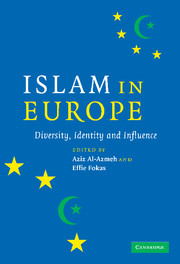Book contents
- Frontmatter
- Contents
- List of figures
- List of contributors
- List of abbreviations
- Preface
- 1 Introduction
- 2 Christians and Muslims: memory, amity and enmities
- 3 The question of Euro-Islam: restriction or opportunity?
- 4 Muslim identities in Europe: the snare of exceptionalism
- 5 From exile to diaspora: the development of transnational Islam in Europe
- 6 Bosnian Islam as ‘European Islam’: limits and shifts of a concept
- 7 Islam in the European Commission's system of regulation of religion
- 8 Development, discrimination and reverse discrimination: effects of EU integration and regional change on the Muslims of Southeast Europe
- 9 Breaching the infernal cycle? Turkey, the European Union and religion
- 10 Afterword
- Index
- References
6 - Bosnian Islam as ‘European Islam’: limits and shifts of a concept
Published online by Cambridge University Press: 05 June 2012
- Frontmatter
- Contents
- List of figures
- List of contributors
- List of abbreviations
- Preface
- 1 Introduction
- 2 Christians and Muslims: memory, amity and enmities
- 3 The question of Euro-Islam: restriction or opportunity?
- 4 Muslim identities in Europe: the snare of exceptionalism
- 5 From exile to diaspora: the development of transnational Islam in Europe
- 6 Bosnian Islam as ‘European Islam’: limits and shifts of a concept
- 7 Islam in the European Commission's system of regulation of religion
- 8 Development, discrimination and reverse discrimination: effects of EU integration and regional change on the Muslims of Southeast Europe
- 9 Breaching the infernal cycle? Turkey, the European Union and religion
- 10 Afterword
- Index
- References
Summary
Because of the Yugoslav wars, the 1990s were marked by the rediscovery of an ancient and autochthonous Muslim presence in Europe. Bosnian Muslims, in particular, have become the symbol of a European Islam that had been covered up by the Cold War and forgotten by Western Europe, as well as by the Muslim world. However, present insistence on the European dimension of Bosnian Islam has created as many problems as it has solved for a better understanding of the religious identity of Bosnian Muslims and of their position in the complex relations between Europe and Islam.
Bosnian Muslims are, undoubtedly, Europeans, just like their Serbian and Croatian neighbours. They have their own way of expressing their Muslim identity, as illustrated by the work of the anthropologists William Lockwood, Cornelia Sorabji and Tone Bringa. But the notion of ‘European Islam’ often encompasses phenomena that are quite distinct, or even largely opposed to one another. For example, the sufi (mystic) or syncretistic practices present in traditional Bosnian Islam are of Ottoman origin. Meanwhile, the deep secularisation of contemporary Bosnian society, reflected by the frequency of mixed marriages and the widespread consumption of alcohol, is a result of fifty years of Communist modernisation. In some cases, the idea of Balkan Islam as a genuine ‘European Islam’ is even based on false assumptions: in 2001, a well-known American think tank stated that ‘Wahhabi practices find little support from the essentially Bektashi Balkan [Muslim] communities’, whilst a large majority of Balkan Muslims – including Bosnian ones – are in fact Sunni Muslims belonging to the hanefi rite, and Bektashis are mainly present in Albania, where they represent only 20 per cent of the Muslim population.
- Type
- Chapter
- Information
- Islam in EuropeDiversity, Identity and Influence, pp. 96 - 124Publisher: Cambridge University PressPrint publication year: 2007
References
- 7
- Cited by

